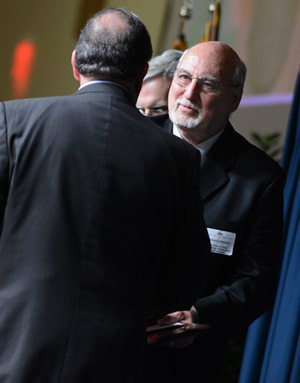James Johnson
The Richard S. Howe Outstanding Undergraduate Teaching Award
Shaping young minds for lifelong success
James Johnson was graduating from high school when he faced a critical, life-changing decision: accept a scholarship to study flute or pursue a degree in engineering. Johnson, currently a senior lecturer at UTSA’s Department of Mechanical Engineering, said the decision was tough, but engineering has always been his passion.
“I figured I would starve to death as a musician, so I pursued engineering,” he chuckled light-heartedly. “And while I still enjoy the flute, sometimes even playing with my granddaughter, I think I made the right choice.”
Johnson was recently honored with The Richard S. Howe Outstanding Undergraduate Teaching Award, which recognizes sustained excellence in working with undergraduate students in signature experiences outside of the traditional classroom environment. These experiences can include providing extensive mentoring; designing and overseeing service-learning experiences; chairing Honors theses; and supervision of undergraduate research or study abroad experiences for undergraduates.
He recalled the day he learned about his award, quite appropriately, in the middle of one of his classes.
“I looked up and saw a number of people enter the room, one carrying balloons, followed by a cameraman,” he said. “Dean Browning walked to my podium and announced I had won the award. The most rewarding moment was when my entire class of 98 students erupted in hoots, hollers and applause. It was a moment of confirmation that maybe what I do really does matter!”
Growing up in Harlingen, his passion for engineering was fostered by his father, who worked for the railroad. His childhood was idyllic and carefree, filled with adventures in scouting, baseball, water skiing and the flute. But his exposure to his father’s engineering office left a long-lasting impression
“When I was young, I would spend Sunday mornings after church at his office playing around with the drafting tables and drawing instruments. This is where the passion for design started,” he said.
His fervor for engineering really took off in high school, when he applied for an amateur radio license. He passed a test in which he had to send and receive Morse code. From there, he started building receivers and transmitters.
“My weekends were filled with designing, building, flying and crashing model airplanes and rockets,” he recalled with a smile. “Somehow the science thing was in my blood. I wanted to design things to solve technical problems, especially those related to airplanes and space flight. That passion has never left my soul and that’s what has kept me going through my professional career.”
Before Johnson began teaching at UTSA in 2010, he had a successful four-decade-long career at the Southwest Research Institute as a researcher and engineering manager. Today, he takes his roles as mentor, advisor and instructor seriously, especially when considering he is shaping the minds of future engineers and builders.
“My primary academic responsibility is to guide raw recruits through a transformation process, so they are battle-hardened, confident and competitive engineers, ready to excel,” he noted. “I’ve seen it all and I can pass along considerable wisdom and keys to success. As my students will tell you, the Capstone Senior Design class is no push over. It takes grit, guts, and determination to make it through.”
He believes encounters with his students are a learning opportunity for everyone.
“I listen to my students and always reflect upon the fact I was once a student, but I also do my best to impart my lifelong wisdom. I’ve learned much by applying one of Steven Covey’s principles: ‘Seek first to understand and then be understood,’” he added.
His teaching style can be deemed unconventional, as Johnson recalled a meeting in which improving the “student pass rate” was a hot topic of discussion. During the meeting, Johnson argued his students deserved better than just passing: they deserved a quality engineering education.
“Our grandchildren will be driving over bridges, flying airplanes, driving cars, using medical and commercial products designed by UTSA-educated engineers. I want competent engineers in the industry, with integrity,” he explained. “If I and other engineers can impart our passion for seeking the complete engineering or scientific truth, then graduation rates take care of themselves.”
One of the best rewards of teaching, Johnson said, is seeing firsthand the successes of his students, especially when they have overcome challenges and still were able to deliver.
“For all their hard work, there are one to three patents or provisional patents that come out each semester and usually one company is formed,” he noted. “The class has won numerous entrepreneurial competitions and NASA Design Challenge awards, as well.”
Although his teaching life is busy, he has not forgotten about the important role his family plays in his life. He makes time for white water rafting and extended family vacations with wife Patricia and their children, now grown with families of their own. Spirituality and his family are at the top of his list of priorities.
“I think a rewarding life is all about balance between the many choices we might have and the energies we put into the paths to fulfill our destiny. Whatever you think is critical today because someone else told you so, probably isn’t.”
– Rebecca Esparza/MBA


